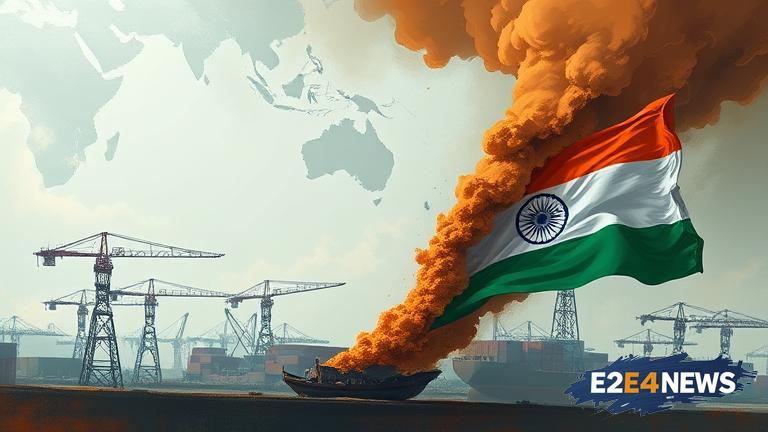The United States has announced the imposition of new tariffs on Indian exports, which will come into effect from Wednesday. This move is expected to have a significant impact on India’s economy, particularly on its export sector. The tariffs, which range from 10% to 25%, will be imposed on a wide range of Indian products, including textiles, chemicals, and pharmaceuticals. The Indian government has expressed concern over the move, stating that it will have a negative impact on the country’s trade balance. The US has cited the need to protect its domestic industries as the reason for imposing the tariffs. However, India has argued that the move is unfair and will harm the interests of Indian exporters. The Indian export sector is a significant contributor to the country’s GDP, and the imposition of tariffs is expected to lead to a decline in exports. This, in turn, will have a negative impact on the country’s economic growth. The Indian government has been engaging with the US authorities to try and resolve the issue, but so far, no agreement has been reached. The imposition of tariffs is also expected to lead to a rise in prices of Indian products in the US market, making them less competitive. This could lead to a decline in demand for Indian products, further exacerbating the impact on the export sector. The Indian government has announced that it will take all necessary measures to protect the interests of Indian exporters and to mitigate the impact of the tariffs. The government has also stated that it will engage with other countries to explore alternative markets for Indian exports. The imposition of tariffs by the US is not an isolated incident, and it is part of a larger trend of protectionism that is being witnessed globally. The move is expected to have far-reaching implications for global trade and could lead to a rise in trade tensions between countries. The Indian government has called for a multilateral approach to resolve trade disputes and to promote free and fair trade. The World Trade Organization (WTO) has also expressed concern over the rise in protectionism and has called for countries to work together to promote trade liberalization. The imposition of tariffs by the US is a significant blow to India’s export sector, and it is expected to have a negative impact on the country’s economy. The Indian government will need to take swift and effective action to mitigate the impact of the tariffs and to protect the interests of Indian exporters. The government will also need to engage with other countries to explore alternative markets for Indian exports and to promote trade liberalization. The situation is being closely watched by economists and trade experts, who are warning of a potential trade war between the US and India. The impact of the tariffs will be felt across various sectors, including textiles, chemicals, and pharmaceuticals. The Indian government has announced that it will provide support to exporters who are affected by the tariffs, including financial assistance and other incentives. The government has also stated that it will take all necessary measures to protect the interests of Indian exporters and to promote trade liberalization. The imposition of tariffs by the US is a significant challenge for the Indian government, and it will require a coordinated and effective response to mitigate the impact and to protect the interests of Indian exporters.
